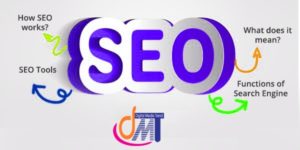Difference between Internet Marketing and Digital Marketing
Digital marketing, Internet marketing, Content Marketing, SEO marketing. It is amazing to find out what all of these marketing conditions mean and how they fit together. And once you have unraveled the definitions, you must decide which marketing methods match your business goals.
What does ‘digital marketing’ actually mean? First, let’s look at marketing as a whole. Marketing is a set of tactics that distinguish your company from competitors and get people to buy products. This includes the research that you use to develop campaigns. The goal is to transfer different points of sale so that customers choose your company.
Traditional marketing can take place just about anywhere. Trade shows, TV ads and press releases are common ways to promote a business and attract customers. But marketing also takes place when you provide an excellent service and customers tell their experiences.
What does “Digital Marketing” mean?
The marketing methods or platforms that you use are called channels. Digital marketing means that you use online channels to promote the benefits of your products. Sending emails, blogging and connecting on social media all fall into this broad category. Online channels enable external but authentic interactions that build loyalty. Common channels for digital marketing include:
- Business websites and blogs
- Search engine optimization
- Email subscription lists
- Social media websites
- Business networking sites
- Online testimonials and review sites
- Video sharing sites
- Distributor press release
- Paid internet advertisements
- Apps and online tools
Digital marketing has become one of the most effective ways to reach customers. In a 2015 survey, Pew Research Center reported that 21 percent of Americans go online “almost constantly” and 42 percent go online multiple times a day. With so many people using mobile devices, it is very common to always be online.
Connecting to people you can’t see may seem like a challenge. In reality, the internet creates many new opportunities to find out more about customers. The result is that you can attract more people to your company with targeted marketing.
Digital Marketing vs. Internet Marketing
Now that you understand digital marketing, it raises a greater demand. What is the difference between internet marketing and digital marketing? If all these activities happen online, why use so many different words to describe them?
Internet marketing means that a presence on the web is built up and the resulting traffic is converted into sales. When the internet was younger, the four most important marketing activities related to:
- Creating websites
- Purchase of pay-per-click advertisements
- Set up web storefronts
- Use keyword groups to record search engine traffic
Yet online marketing has become many activities that do not include internet search engines, paid advertisements or websites. People use a wide range of digital devices to go online and communicate with content. By reaching customers through online channels that they often use, you can influence their purchasing choices offline.
Consider how often you make contact with brands. Customers form a positive opinion about products or services from reading blogs. Interactive video ads ensure that viewers make decisions. Customers receive discount coupons for local stores directly via smartphone apps. Internet marketing is an important subcategory of digital marketing. And digital marketing includes various online and offline tactics that stimulate digital engagement.
How Content Marketing and SEO Influence Digital Marketing?
Internet, SEO and content marketing are important pillars of digital marketing. Combining these strategies is the best way to set up and grow a competent company.
SEO or search engine optimization is formatting your website and content to improve search results. The internet is full of websites and blogs that fight for attention. However, targeting niche markers that your customers are looking for can reduce online competition.
Content marketing involves creating assets that offer value to your customers. Online assets, such as blogs, photos, videos and guides, increase the awareness of your brand. By creating content, customers are encouraged to trust you and make contact with your company. Because content is easy for customers to share, it also brings a lot of traffic to your sites.
Getting good leads is a constant challenge for entrepreneurs. Customers respond less to open sales pitch, so intrusive advertisements are not the best way to attract them. While passive activities, content and SEO marketing show customers, you can answer their questions. These methods support your digital marketing plan by consistently attracting traffic from incoming sites to your site.
Benefits of Digital Marketing
You may have noticed that online communities and platforms are becoming more connected with each other every day. Digital marketing gives companies of all sizes access to a larger customer base. At the same time, digital marketing includes many organic tactics that help brands create an authentic image. Consider these five benefits of digital marketing when expanding your business.
- Range of influence: small businesses can make contact with people around the world. A larger customer base in turn increases the sales potential. The internet is a content economy, making it easy for entrepreneurs to profile themselves online as experts. The more you know, the more power you have to educate and influence customers.
- Accurate targeting: offline, companies have limited resources to track customer behavior. Digital marketing delivers a wealth of data with the right tools. Everything a customer does leaves a trace online. The information you collect about customers helps you refine your marketing messages to meet their needs
- Cheap campaigns: digital marketing is time-consuming, but not expensive. See social media as an example. A small company can connect with customers on Facebook or Twitter as easily as a global brand. Smaller companies often have more one-to-one interaction with customers. That leads to loyal relationships and word of mouth.
- Direct feedback: with traditional marketing it can take time to find out what customers want. With digital marketing you can receive timely feedback from multiple channels. Online surveys, emails, forums, responses to social media and reviews speed up all communication.
- Faster implementation: digital channels shorten the time needed to develop successful campaigns. Traditional marketers spend weeks or months researching, creating and approving a campaign. With digital channels you can create campaigns more often to keep customers involved. Because costs are generally low, you can test many small campaigns to find the right approach.
Opt for Digital Marketing Strategies for your Company
The most important thing about digital marketing is flexibility. You don’t have to copy everything your competitors do to be successful. Focus on where your customers are online and connect with them at important contact moments. There is no point in wasting time on Facebook when all your customers are on LinkedIn and Twitter.
Follow your online marketing activities to further refine your methods. Digital marketing trends are evolving rapidly. It is essential for companies to change customers and be of service in a way that is important to them. Marketing is also about distinguishing your brand. If you can identify unfilled niches, do not hesitate to try online methods that your competitors do not use.
The first step in developing a digital marketing strategy is to set up a professional company website.
 Bloggers Trend Keeping You Up To Date
Bloggers Trend Keeping You Up To Date



